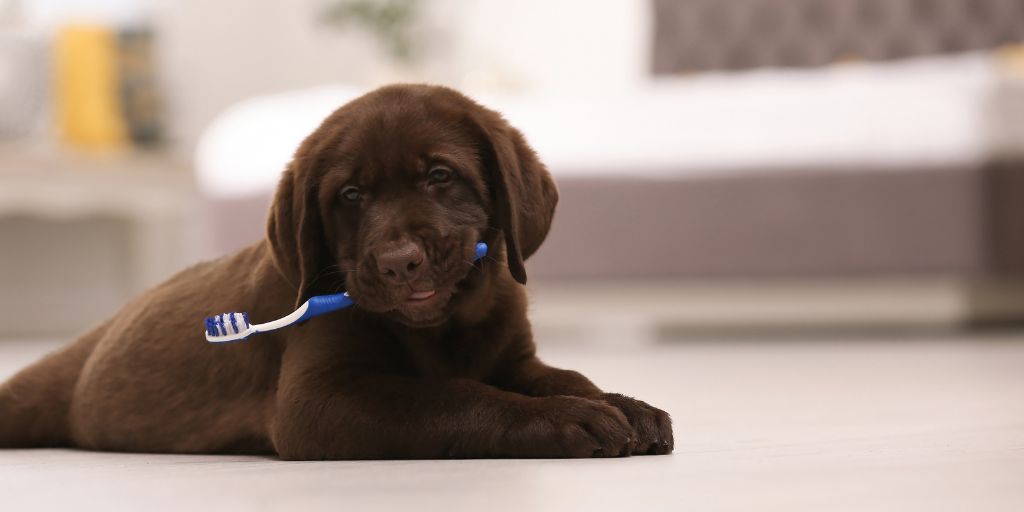Most people don't realize how important dental care is for your dog and his or her health. Dental disease is actually one of the most common major health issues in pets. And unchecked gum inflammation can cause your pet to be at a higher risk for heart, kidney and liver disease. This is why taking care of your dog's teeth and gums is nearly as important as proper exercise and a healthy, well-balanced diet.
Where To Start
While your vet will check your dog's dental health during their regular visits, there's more you can do. One of the most effective ways to prevent gum disease is at-home care. And the earlier you get started, the better.
Brushing Your Dog's Teeth
One of the best ways to care for your dog's dental health is by brushing his or her teeth. Brushing every day is ideal but it's not always possible in reality. So it's recommended that you brush your dog's teeth 2-3 times a week otherwise.
What brush to use? There are special dog toothbrushes with soft bristles as well as finger toothbrushes that will work well for your pup. You may be able to get away with using a child's toothbrush but adult brushes are often too large and tough on the gums. You can also try gauze around your finger or a cotton swab.
What toothpaste to use? Dog toothpastes are specially formulated for your pup and come in canine-friendly flavors like poultry, vanilla, mint and more. This makes them safe and more enjoyable. Don't use human toothpaste, baking soda or salt as these can be harmful to your dog.
Pro Tip: Find a toothpaste your dog likes because it will make brushing time easier for you and more enjoyable for all involved. Feel free to give your dog a few tastes before actually starting the brushing so they can enjoy the flavor.
Here are some common ingredients in pet toothpaste:
- Silica – Abrasives that are effective at scraping away tartar from the tooth’s surface.
- Enzymes – Proteins that reduce bacteria in the mouth (and helps reduce bad breath).
- Emulsifiers – Salts that help control the build-up of tartar.
- Sorbitol – A sweetener for taste (not to be confused with the sweetener Xylitol, which is toxic to dogs).
How to brush your dog's teeth? Start by lifting your pup's lip to expose the surfaces of the teeth and gums. Use gentle motions while brushing and try to brush for at least 30 seconds (but don't push your pup - if they aren't comfortable and you only get a few teeth, try for longer next time). Focus on the outward-facing surfaces, as most pets won't allow you to brush on the inside surfaces (but if they do, all the better!). And remember to brush their back upper canines and molars, which tend to get tartar build-up more quickly than other teeth.
Pro Tip: Use a comfortable place for your dog to sit during their brushing session and reward him or her with treats, pats, play, etc. after brushing for positive reinforcement.
Other Ways To Improve Dental Health
There are lots of products out there for your pup's dental care. You can use water additives and other solutions, dental treats and toys and you can even put your dog on a special dental diet.
Pro Tip: Chewing is a helpful activity for your dog in terms of dental care. Try giving your dog bully sticks and other safe chewing bones on a regular basis to fight plaque and tartar build-up.
Also make sure to keep your dog's water fresh and clean his or her bowls regularly to prevent bacteria buildup. It's recommended that you give your dog fresh water every day and even more frequently for big droolers.
In addition, dry food may be better than soft food. This is because crunchy kibble is less likely to stick to the teeth and more likely to remove some plaque off the top of your dog's teeth. That being said, it's important to note that kibble will probably not remove plaque around the gumline, where it can cause the most harm. Moreover, kibble tends to contain more refined carbohydrates that could eventually lead to more plaque and tartar.
Examine Your Dog's Teeth
All in all, it's a good idea to examine your dog's mouth regularly (once a week is recommended). Signs of dental disease or other issues include brown buildup on teeth (which is plaque and tartar), swollen gums, bleeding gums and abnormal bumps or lumps. Make sure to check the surfaces and top of your dog's back teeth and molars. Also examine the color of the gum, which should be pink and shiny not white or dark red. If you notice any changes or something unusual, talk to your vet.

